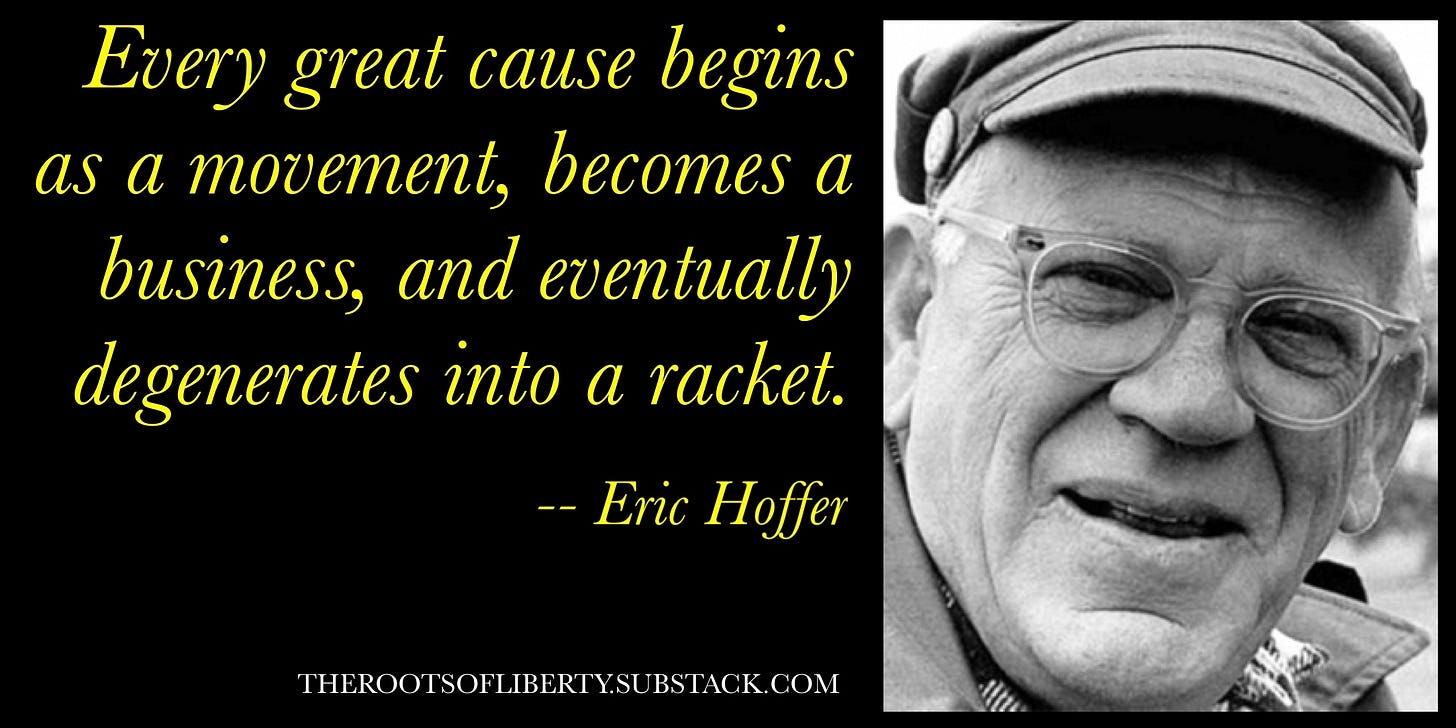Enviro-Dabbling
A few decades back, when I was a twenty-something just starting out in the world of jobs and adult life, I got drawn into environmentalism - a little bit. I donated small sums of money to Greenpeace, the Sierra Club, the World Wildlife Federation, and others, and read that which they sent me. I talked about the environment and doing right by it with people when the subject came up.
I wasn't really much of one - it was just one of many things I found interesting and agreed with - but I did proclaim myself part of the movement.
Until I learned of some lies. Not errors - lies. One in particular, about species loss due to rain forest deforestation, was made up by a leading advocate. Really - he freely admitted it in an interview I read. He wanted to assert a number that would outrage but not prompt disbelief. It worked on me, for a while at least. That eye-opening moment sparked a lot of cynicism, and taught the young me that earnestness and good causes do not bestow automatic credibility.
I still consider myself an environmentalist, but I reject the modern movement's view of humanity as some sort plague on Mother Earth. Instead, I believe that we act as stewards, that we care for the Earth in a fashion that benefits humanity, present and future. After all, other than as a habitat for the human race, the Earth is just a meaningless rock.
Having learned the "no free lunch" and opportunity-cost concepts as well, I became over the years more and more skeptical of various superficial and "feel-good" bits of environmentalism. This includes the residential recycling that's become ubiquitous across the nation.
The enviro groups are catching up with my decades-long skepticism and realism.
Behold, the mighty Greenpeace, coming around to what many of us have known for a long time: Not all recycling is worth the effort.
The cold, hard reality is that most residential recycling is not only pointless, it's counterproductive. We sort our trash, put our metals and plastics out on special collection days, paper on different special collection days, and feel we've done our part for Mother Earth. We figure that reusing stuff is better than chucking it into a landfill, and don't think much beyond that. The economics of it all don't enter into our thought processes. We've got other things on our minds, and reflexively assume there must be some point to it all.
Those economics matter. Some things are worth sorting and recycling: metals, cardboard, paper. Especially if one factors in environmental carbon. Others, no. Yet, we have such a visceral response to the notion of simply landfilling our Tide containers and Poland Spring bottles that we embrace the sorting and special collections. Politicians know and respond to this, so plastic recycling continues as a giant virtue signal, its costs buried or ignored, and the final disposition of those separately-collected plastics left unspoken.
The dog-and-pony-show aspect of recycling in an era of Green everything is why we will continue to waste time and money on pretend plastic recycling. The economics are secondary to the feel-good, and that feel-good has been established and amplified by people who don't give the slightest [redacted] about wasting Other People's Money.
Cue up global warming.
Here we find the same sort of dabbling among most of the populace. People buying hybrids and electric vehicles, despite mixed enviro-economics, because they're told plugging in is better than burning gas. No matter if that plug connects to a coal plant. People supporting a break-neck conversion to wind and solar, no matter that the materials to build those panels and windmills are harvested and refined in really dirty ways, no matter that the intermittency/storage problem remains unsolved, no matter that our grids are not ready, no matter that unfriendly nations control most of the raw materials needed for this mass conversion, no matter that none of it adds up - especially when nuclear power is excluded.
I've covered all this ground before. Unfortunately, sanity will not prevail, because, as the inestimable Eric Hoffer told us:
Green is now a racket. That some aspects of it are actually good ideas is secondary - and "actually good ideas" are often shunted aside when they don't produce the proper pelf. Truly - remedies that don't advance global economic restructuring (see: nuclear power) or offer the promise of continuing our living standards as they are (see: geo-engineering research) are either dismissed or actively vilified.
The marketing of global warming mirrors that of recycling, with some good, some bad, and no care for discerning between the two. Nor, generally speaking, for the economics of it all. If global warming were addressed actuarially, the government's approach would be drastically different, and we'd be prioritizing adaptation strategies rather than the brute-force decarbonization folly that is being forced upon us.
The reason it's unfolding in this manner is the dabbling. I surmise that most Americans are dilettantes when it comes to global warming. They have a superficial knowledge, curated by people who stand to make money, gain power, or sate their own (often emotional rather than rational) desires, but they don't dive deep or raise eyebrows of skepticism. They show their "green" in easy or superficial ways, ways that feed the ego and add to the preening, but that are often at odds to the reality of the situation. They're also susceptible to fads, such as nut milk. No matter that California's water shortages are directly traceable to ridiculously sweetheart pricing enjoyed by the farmers there, whose trees consume five liters of water for every almond produced. Everyone "knows" that cow farts are killing the planet, and everyone "knows" that almond milk is "green." The reality, being inconvenient, is either buried or ignored.
Movements and causes have life cycles, and we are in the "racket" stage when it comes to environmental action. That's our own fault. Alexander Pope warned us that "a little learning is a dangerous thing." David Dunning and Justin Kruger warned us similarly. Libertarians often ask "is the cure worse than the disease?"
All these urge caution and introspection prior to action. The realities of human nature should also elicit skepticism and doubt when it comes to large and rapid changes, especially when those changes are sold with emotional and hyperbolic arguments. We've been fed decades of warnings about imminent environmental doom, warnings that repeatedly failed to materialize, yet so many of us continue to believe the same repeated warnings, with the doomsdays moved from a couple decades ago to a couple years from now.
Present-day dilettantes suffer from another character flaw - that of arrogance. There's a whole lot of it in the enviro movement, where being anything less than a doomsayer or questioning the decreed remedy is an invitation for scorn and insult. Scorn is, unfortunately, often quite effective. The best counterweight to dilettantes' scorn is what should be dubbed the Trudeau Tenet:
If you've done your due diligence, and have a solid foundation for concluding as you have, you should laugh off those who mock you for not aligning with their dabbles. Be open to insight, but don't grant power to those who don't deserve it.
Thank you for reading! If you enjoy The Roots of Liberty, please subscribe (if you have already, thank you!), please hit that “like” button to let me know, please share any article you like wherever you roam the Internet, and please recommend the blog to your friends.
If you really like The Roots of Liberty and want to help keep it rolling, please consider becoming a paying subscriber here at Substack, or at a lighter level as contributor to the blog via Patreon.
Thank you, again, for your support!
Peter





I think the saddest part of this "climate emergency" scaremongering is the toll it's taking on children. Kids are taught now (by parents, educators, or both) that we're all doomed, and it's taking a toll on their mental health. Not to mention the financial burden the governments of the world are forcing on us all
Color me one of those passionately green conservatives, but with an engineering and science background and willing to do the research on what actually helps. I'm encouraged by the recent advance in fusion energy and realize even that is just a transitory discovery. As long as we exist in the universe, we will be learning. https://www.wsj.com/articles/nuclear-fusion-breakthrough-what-to-know-11670976073?siteid=yhoof2&yptr=yahoo